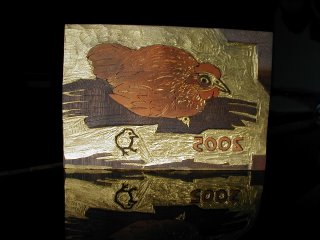SideLines, September 2006
Actually, a spam attack on our forums has forced us to require that all forum contributors register.
So you may - and you must - register to post messages and replies in the Co-op forums. Registering is not difficult and is still free (use the Registration link in the main menu, near the top).
Reading and using information from the forums is completely open to everyone. Our aim has always been to communicate offers and requests - for language services, for research - as openly and widely as possible.
To express any opinion about this matter, please use our Viewpoints column (see the website), or contact Peter, c/o The Research Cooperative (NZ): pjm (at) gol (dot) com). Thank you!
Thursday, August 31, 2006
Tuesday, August 01, 2006
Kids may miss the wood of science....
 SideLines, August 2006
SideLines, August 2006Kids may miss the wood of science if they are only shown the trees of maths, physics and chemistry.
The Asahi Newspaper of Japan recently ran the following headline in their English edition: "Firms take roadshows to schools to prove science is fun: Companies fear falling interest in science and math will leave them short-staffed in global rivalries" (July 2006).
Here is a list of all the companies and industries mentioned in the article, from first to last: Kyowa Hakko Kogyo Co. (pharmaceutical & biochemical manufacturing), Biofrontier Laboratories (biotechnology), Bayer Japan Ltd (medicines), NEC Corp (electronics), Matsushita Electric Industrial Co. (electronics), IBM Japan Ltd (computers). The Japan Chemical Industries Association is sponsoring chemistry competitions in Japan.
How depressing! Young students should be introduced to the full universe of natural, social and physical sciences... through everyday opportunies in school and outside school. They need chances to learn from parents and teachers, in settings that encourage an organic and gradual development of scientific understanding.
Putting just a few selected school kids into pressure cookers designed for specific areas of science will fail to catch the interest of many potential thinkers.
All students - regardless of their apparent academic level - deserve opportunites to discover and follow their own personal scientific interests. This can be done by putting science into the curricula of all subjects taught in schools.
Give art students oportunities to learn about the chemistry of pigments, and give science students art lessons to teach them some tricks of observation.
Encourage students to test their abilities and stretch their imaginations, in any field, and of all kinds of science will naturally follow.
To express any opinion about this matter, please use our Viewpoints column (link above) or contact Peter, c/o The Research Cooperative (NZ): pjm (at) gol (dot) com).
Subscribe to:
Posts (Atom)